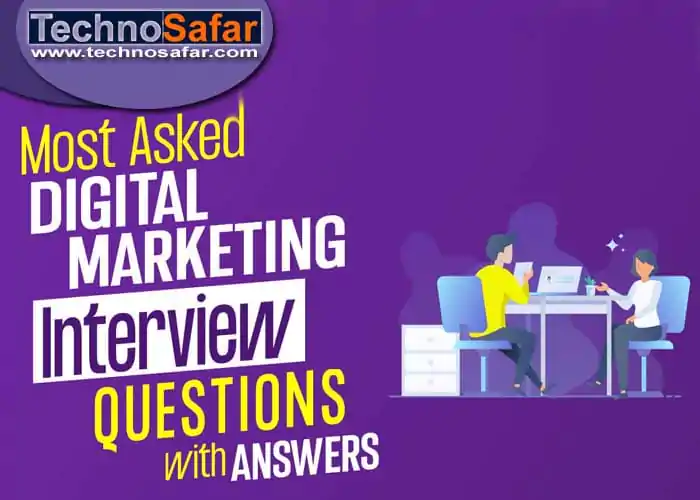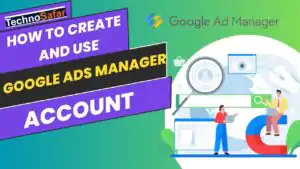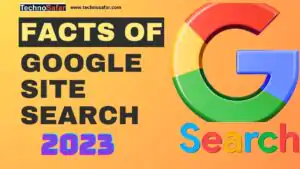Digital Marketing Interview Questions And Answers For Freshers
In preparation of the advance level, we will tell you which questions will further enhance your knowledge of digital marketing and increase your chances of clearing the interview.
So let’s know why it is important to read this article and why to prepare for digital marketing Interview Questions and Answers at an advanced level:
This article will prepare you completely for the interview, so you know about analysis based questions. In this article, more focus has been given on objective questions.
You can Read Also: 10 Easy Steps – How to Connect Blog to Google Analytics

Digital Marketing Interview Questions And Answers
#1 Q.: What is digital marketing?
Ans: Digital marketing is the promotion of products or services using digital channels such as search engines, social media, email, mobile apps, and websites.
#2 Q.: What are the benefits of digital marketing?
Ans: Some benefits of digital marketing include increased brand awareness, targeted advertising, increased website traffic, improved customer engagement, and more effective lead generation.
#3 Q.: What are the different types of digital marketing?
Ans: The different types of digital marketing include search engine optimization (SEO), pay-per-click (PPC) advertising, social media marketing, content marketing, email marketing, mobile marketing, and affiliate marketing.
#4 Q.: What is SEO?
Ans: SEO stands for search engine optimization, which is the process of optimizing a website or web page to rank higher in search engine results pages (SERPs). This is done through a variety of techniques, such as keyword research, on-page optimization, and link building.
#5 Q.: What is the difference between SEO and SEM?
Ans: SEO is the process of optimizing a website to improve its visibility and ranking in search engine results pages (SERPs) organically, while SEM, or search engine marketing, is a paid advertising model that involves paying for clicks or impressions in search engine results pages.
#6 Q.: What are some common SEO techniques?
Ans: Common SEO techniques include keyword research, on-page optimization, link building, and content creation.
#7 Q.: What is a backlink?
Ans: A backlink is a link from one website to another. Backlinks are important for SEO because they signal to search engines that other websites consider your content valuable.
#8 Q.: What is PPC advertising?
Ans: PPC advertising is a form of digital advertising in which advertisers pay each time a user clicks on one of their ads. The most popular PPC advertising platform is Google Ads.
#9 Q.: What is mobile marketing?
Ans: Mobile marketing is the use of mobile devices such as smartphones and tablets to promote products or services.
#10 Q.: What is a landing page?
Ans: A landing page is a web page designed specifically for a marketing campaign, with the goal of converting visitors into leads or customers.
#11 Q.: What is conversion rate optimization?
Ans: Conversion rate optimization (CRO) is the process of improving the percentage of visitors to a website who take a desired action, such as making a purchase or filling out a form.
#12 Q.: What is a buyer persona?
Ans: A buyer persona is a semi-fictional representation of your ideal customer based on market research and real data about your existing customers.
#13 Q.: What is a customer journey?
Ans: A customer journey is a path a customer takes from initial awareness of a product or service to the point of purchase.
#14 Q.: What is lead generation?
Ans: Lead generation is the process of identifying and cultivating potential customers for a product or service.
#15 Q.: What is a sales funnel?
Ans: A sales funnel is a visual representation of the journey a prospect takes from initial awareness to becoming a customer.
#16 Q.: What is inbound marketing?
Ans: Inbound marketing is a customer-centric approach to marketing that focuses on creating valuable content to attract and engage prospects, rather than interrupting them with ads.
#17 Q.: What is outbound marketing?
Ans: Outbound marketing is a traditional marketing approach that involves pushing messages to a wide audience, such as TV ads, direct mail, and telemarketing.
#18 Q.: What is Google Analytics?
Ans: Google Analytics is a free web analytics service offered by Google that tracks and reports
#19 Q.: What are the most common digital marketing channels?
Ans: The most common digital marketing channels include search engine optimization (SEO), pay-per-click (PPC) advertising, social media marketing, email marketing, and content marketing.
#20 Q.: What is PPC advertising?
Ans: PPC advertising is a type of online advertising where advertisers pay each time a user clicks on one of their ads. These ads can appear on search engine results pages, social media platforms, and other digital channels.
#21 Q.: What is social media marketing?
Ans: Social media marketing involves promoting products or services through social media platforms like Facebook, Twitter, Instagram, and LinkedIn. This can include organic social media posts, paid social media ads, and influencer marketing.
#22 Q.: What is email marketing?
Ans: Email marketing involves using email to promote products or services to a list of subscribers. This can include newsletters, promotional emails, and automated email sequences.
#23 Q.: What is content marketing?
Ans: Content marketing involves creating and sharing valuable content with the goal of attracting and retaining a target audience. This can include blog posts, videos, infographics, and more.
#24 Q.: What is affiliate marketing?
Ans: Affiliate marketing is a type of performance-based marketing where affiliates promote a product or service and get a commission for each sale they generate.
#25 Q.: What is influencer marketing?
Ans: Influencer marketing involves partnering with influencers to promote products or services to their audience. This can include sponsored posts, product reviews, and more.
#26 Q.: What is a landing page?
Ans: A landing page is a web page that is designed specifically to convert visitors into leads or customers. These pages typically have a single focus and a clear call-to-action.
#27 Q.: What is A/B testing?
Ans: A/B testing is the process of testing two different versions of a web page or email to see which performs better. This is done by randomly showing one version to a portion of the audience and the other version to another portion, and then comparing the results.
#28 Q.: What is a conversion rate?
Ans: A conversion rate is the percentage of visitors to a website or landing page who take a desired action, such as making a purchase or filling out a form.
#29 Q.: What is a customer persona?
Ans: A customer persona is a detailed description of a target customer. This includes demographic information, interests, pain points, and other relevant information.
#30 Q.: What is remarketing?
Ans: Remarketing involves targeting people who have already interacted with your brand, such as by visiting your website or adding a product to their cart, with ads to encourage them to return and complete a purchase.
#31 Q.: What is a call-to-action?
Ans: A call-to-action (CTA) is a button, link, or another element on a web page that encourages the user to take a specific action, such as making a purchase or filling out a form.
#32 Q.: What is social proof?
Ans: Social proof is the idea that people are more likely to trust and follow the actions of others. This can include customer reviews, testimonials, and social media engagement.
#33 Q.: What is a lead magnet?
A lead magnet is a free piece of content or offer that is used to entice visitors to provide their contact.
Digital Marketing Interview Questions and Answers for SEO
#34 Q.: What are keywords?
Ans: Keywords are specific words or phrases that people type into search engines to find information, products, or services. Identifying and targeting the right keywords is crucial for a successful SEO strategy.
#35 Q.: How can I improve my website’s SEO?
Ans: Some ways to improve your website’s SEO include: optimizing your content and meta tags with relevant keywords, building high-quality backlinks, improving website speed and user experience, and ensuring your website is mobile-friendly.
#36 Q.: What is Keyword Stuffing?
Ans: Keyword stuffing refers to the practice of overusing or repeating a particular keyword or phrase in an attempt to manipulate search engine rankings. This practice is considered unethical and can result in penalties from search engines, as it undermines the quality and relevance of search results.
#37 Q.: What is on-page SEO?
Ans: On-page SEO refers to the optimization of individual pages on your website. This includes optimizing the content, meta tags, URL structure, and internal linking of each page.
#38 Q.: What is off-page SEO?
Ans: Off-page SEO refers to activities that are done outside of your website to improve its ranking in search engine results in pages. This includes building backlinks, social media marketing, and other forms of online promotion.
#39 Q.: What is local SEO?
Ans: Local SEO is the practice of optimizing your website and online presence to rank higher in local search results. This includes optimizing your Google My Business listing, building local citations, and targeting location-specific keywords.
#40 Q.: What is black hat SEO?
Black hat SEO refers to unethical SEO tactics that violate search engine guidelines. These tactics can result in penalties or even the removal of your website from search engine results pages.
#41 Q.: How long does it take to see results from SEO?
Ans: It can take anywhere from a few weeks to several months to see significant results from SEO. The time frame depends on a variety of factors, including the competitiveness of your industry and the quality of your SEO strategy.
#42 Q.: What are Google algorithm updates?
Ans: Google algorithm updates are changes to the way Google ranks websites in search engine results pages. These updates can have a significant impact on website rankings and SEO strategies, so it’s important to stay up-to-date on the latest updates and adjust your strategy accordingly.
Digital Marketing Interview Questions and Answers for Email Marketing
#43 Q.: What are the Best email marketing apps?
Ans: There are many great email marketing apps available, so it’s important to choose one that best suits your needs. Here are a few popular options to consider:
- Mailchimp: Mailchimp is a popular email marketing app that is easy to use and offers a range of features, including email templates, automation, segmentation, and analytics.
- Constant Contact: Constant Contact is another popular email marketing app that offers customizable templates, list-building tools, and automation features. It also offers a range of integrations with other marketing tools.
- Campaign Monitor: Campaign Monitor offers a range of email marketing features, including customizable templates, automation, and segmentation. It also offers analytics and integrations with other marketing tools.
- Convert Kit: Convert Kit is a popular email marketing app for bloggers, authors, and other content creators. It offers automation features, customizable templates, and a range of integrations.
- AWeber: AWeber is an email marketing app that offers customizable templates, automation features, and integrations with other marketing tools. It also offers a range of email marketing education resources.
Ultimately, the best email marketing app for you will depend on your specific needs and budget. It’s important to research and compares different options to find the one that works best for your business.
#44 Q.: What are the benefits of email marketing?
Ans: Some benefits of email marketing include: increased brand awareness, improved customer engagement and loyalty, targeted messaging to specific audiences, and the ability to measure and optimize your campaigns.
#45 Q.: What are some key elements of a successful email campaign?
Ans: Some key elements of a successful email campaign include a clear and concise subject line, a compelling call-to-action, relevant and valuable content, a mobile-friendly design, and personalized messaging.
#46 Q.: How do you grow your email list?
Ans: You can grow your email list by offering incentives for sign-ups, such as a free e-book or discount code, promoting your email list on your website and social media channels, and using lead magnets to capture email addresses.
#47 Q.: How do you measure the success of an email campaign?
Ans: The success of an email campaign can be measured using various metrics, such as open rate, click-through rate, conversion rate, unsubscribe rate, and revenue generated.
#48 Q. :What is A/B testing in email marketing?
Ans: A/B testing, also known as split testing, is a technique used to compare two different versions of an email campaign to determine which performs better. This can involve testing different subject lines, call-to-actions, or email designs.
#49 Q.: How do you ensure your emails are delivered to your subscribers’ inboxes?
Ans: To ensure your emails are delivered to your subscribers’ inboxes, you should maintain a clean email list, avoid using spam trigger words, optimize your email design and content, and authenticate your email domain.
#50 Q.:What is email segmentation?
Ans: Email segmentation is the process of dividing your email list into smaller groups based on common characteristics, such as demographics or behaviors. This allows for more targeted messaging and increased engagement.
#51 Q.:How often should you send marketing emails?
Ans: The frequency of marketing emails depends on your business and audience. It’s important to maintain a consistent schedule while also avoiding overloading your subscribers with too many emails.
#52 Q.:What are some email marketing best practices?
Ans: Some email marketing best practices include personalizing your messaging, optimizing for mobile devices, providing valuable content, maintaining a clean email list, and regularly testing and optimizing your campaigns.
Digital Marketing Interview Questions and Answers for SMM
#53 Q.:What is SEM/PPC?
Ans: SEM (Search Engine Marketing) or PPC (Pay-Per-Click) is a digital marketing technique that involves placing ads on search engine results pages (SERPs) and paying each time a user clicks on the ad.
#54 Q.:What is the difference between SEM and SEO?
Ans: SEM involves paying for ads to appear on search engine results pages, while SEO involves optimizing your website to appear in organic (unpaid) search results.
#55 Q.:What are the benefits of using SEM/PPC?
Ans: Some benefits of using SEM/PPC include: immediate visibility on search engines, precise targeting of specific keywords and audiences, and the ability to measure and optimize your advertising campaigns in real time.
#56Q. : What is a quality score in PPC advertising?
Ans: A quality score is a metric used by search engines to evaluate the relevance and quality of your PPC ads and landing pages. It is based on factors such as the click-through rate of your ads, the relevance of your keywords, and the quality of your landing page.
#57 Q.:What are some common bidding strategies in PPC advertising?
Ans: Common bidding strategies in PPC advertising include: manual bidding, automatic bidding, and target cost-per-acquisition (CPA) bidding.
#58 Q.:How do you determine the success of a PPC campaign?
Ans: The success of a PPC campaign can be determined by various metrics, such as click-through rate, conversion rate, cost per click (CPC), cost per acquisition (CPA), and return on investment (ROI).
#59 Q.:What is retargeting in PPC advertising?
Ans: Retargeting is a technique in PPC advertising that involves showing ads to users who have previously visited your website or interacted with your brand. This allows you to target users who are already familiar with your brand and may be more likely to convert.
#60 Q.:How do you optimize a landing page for PPC advertising?
Ans: To optimize a landing page for PPC advertising, you should ensure that it is relevant to the ad that the user clicked on, has a clear call-to-action, is easy to navigate, loads quickly, and is mobile-friendly.
#61 Q.:How do you ensure that your PPC ads are targeting the right audience?
Ans: To ensure that your PPC ads are targeting the right audience, you should conduct thorough keyword research, create specific ad groups for each target audience, use audience targeting options, and monitor and adjust your targeting settings regularly.
#62 Q.:What are some common mistakes to avoid in PPC advertising?
Common mistakes to avoid in PPC advertising include: targeting the wrong audience, using irrelevant keywords, not optimizing your landing pages, not monitoring your campaigns regularly, and not adjusting your bids based on performance metrics.
Digital Marketing Interview Questions and Answers for content writing
#63 Q.:What is content writing in digital marketing?
Ans: Content writing in digital marketing is the process of creating written content, such as blog posts, articles, social media posts, and website copy, with the goal of attracting and engaging an audience, and ultimately driving conversions.
#64 Q.:What are the qualities of good content?
Ans: Good content should be engaging, informative, relevant, and well-written. It should also be optimized for search engines and designed for easy consumption on different devices.
#65 Q.:How do you determine the target audience for your content?
Ans: To determine your target audience, you should conduct market research and identify the demographics, interests, and behaviors of your ideal customer. This will help you tailor your content to their needs and preferences.
#66 Q.:What is a content marketing strategy?
Ans: A content marketing strategy is a plan that outlines the goals, target audience, types of content, and distribution channels for your content marketing efforts. It should also include a plan for measuring and optimizing your campaigns.
#67 Q.:How do you optimize content for search engines?
Ans: To optimize content for search engines, you should conduct keyword research, use relevant and descriptive titles and meta descriptions, incorporate internal and external links, and structure your content for easy reading and navigation.
#68 Q.:What are the different types of content?
Ans: Some types of content include blog posts, articles, infographics, videos, podcasts, social media posts, and email newsletters.
#69 Q.:How do you measure the success of your content marketing efforts?
Ans: The success of your content marketing efforts can be measured using various metrics, such as traffic, engagement, conversions, and return on investment (ROI).
#70 Q.:How do you come up with content ideas?
Ans: To come up with content ideas, you can conduct keyword research, look at trending topics in your industry, analyze competitor content, and survey your audience for their interests and needs.
#71 Q.:How do you ensure your content is original and not plagiarized?
Ans: To ensure your content is original, you should use plagiarism checker tools, properly cite any sources used in your content, and avoid copying content from other sources.
#72 Q.:How do you stay up-to-date with the latest content marketing trends and best practices?
Ans: To stay up-to-date with the latest content marketing trends and best practices, you should regularly read industry blogs and news sources, attend conferences and webinars, and participate in content marketing communities and forums.
Digital Marketing Interview Questions & Answers for Social Media Marketing
Top 20 Amazing Free SEO Tools List 2023
Top 50+ Exclusive WordPress Interview Questions and Answers 2023








